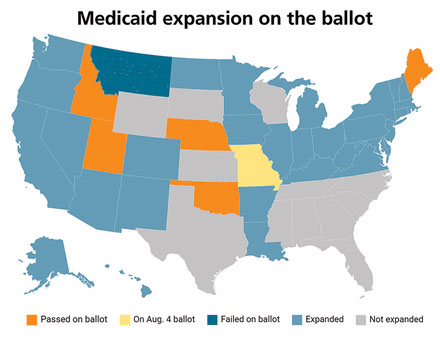General
Americans bringing Medicaid expansion to state ballots
For months, date nights in Idaho for Rebecca Schroeder and her husband consisted of knocking on doors and standing on porches advocating for Medicaid expansion.
The grassroots effort, which involved hundreds of statewide participants, gathered 60,000 signatures, qualifying it for the state ballot. In November 2018, Medicaid expansion in Idaho was approved by 61% of voters. Today, more than 80,000 additional low-income Idahoans have health care coverage under Medicaid because of those efforts.
“It has probably been the best thing to happen in Idaho in decades,” Schroeder, executive director of Reclaim Idaho, which led the effort, told The Nation’s Health.

Expanding Medicaid through a public initiative process has been a successful strategy in states represented by governors or lawmakers who oppose expansion. In 2017, Maine voters were the first to bypass politicians and approve expansion. One year later, Nebraska and Utah passed it on mid-term ballots.
The trend has continued this year. In July, a slim majority of Oklahoma voters said “yes” on the primary ballot, leaving only 13 states that have not expanded Medicaid since the Affordable Care Act went into effect in 2010. Missouri residents were planning to vote in August on whether to expand the program, and advocates in Florida plan to place it on the mid-term ballot for 2022. Expansion is also being debated in Kansas and Texas.
“Hopefully, we provided some inspiration for folks who are still waiting on politicians to do the right thing,” Amber England, campaign manager of Oklahoma Yes on 802, told The Nation’s Health a few days after the 802 ballot measure passed by 6,500 votes. Over 200,000 additional low-income Oklahomans will qualify for Medicaid when the expansion goes into effect in summer 2021.
Continue reading this story from the September 2020 issue of The Nation's Health.
Graphic by Aaron Warnick, The Nation's Health


